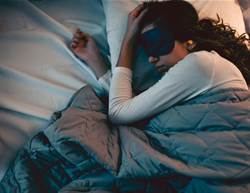After finding herself soaked in sweat in the middle of the night for a few nights in a row, Bree Johnson* was ready to fork out on a new mattress and more breathable bedding – anything to prevent her from having to change the sheets and peel off sopping-wet pyjamas at 3am. The 41-year-old wondered if her night sweats were due to perimenopause and if hormonal fluctuations were to blame. Yet, when Bree mentioned these annoying nighttime awakenings to her doctor, he changed the antidepressant medication she was on and, a few days later, her night sweats stopped. “It was such a simple fix that saved me a lot of money on new bedding,” she says, “and saved my husband from freezing every night, because I no longer needed to have all the windows wide open.”
Most women will experience night sweats (which are called hot flushes when they occur during waking hours) at some point in their life. In fact, more than 80 per cent of women will get hot flushes or night sweats during perimenopause – the time leading up to and including the 12 months after a woman’s last period, when hormone fluctuations lead to all kinds of annoying symptoms. But that’s not the only reason they happen, says gynaecologist Dr Lauren Streicher. “Sometimes night sweats can be a sign of other, sometimes serious, medical conditions,” she explains. This means it’s especially important to understand why they happen and to talk to your doctor about your symptoms rather than soldiering through them and assuming you’re dealing with just another annoying aspect of getting older.
The Science Behind Night Sweats
When you experience a night sweat, it’s because your core body temperature (the human body is meant to hover about 37°C) has gone up, similarly to how it does when you exercise or sit in a hot room – despite the fact you’re sound asleep in a relatively temperature-controlled environment. When your temp rises, your heart rate speeds up and the blood vessels in your skin dilate (or widen) to boost blood flow to the skin’s surface, which helps excess heat leave your body. The result? Your skin gets warm to the touch. When your heart rate peaks, the sweating starts, says Dr Streicher. “This sweating can be mild, where your skin feels a little damp to the touch, or it can be profuse, dripping-down-your-back sweating,” she says. “This heatwave is often followed by shivering and chills as your body cools off.”
In most cases, you can blame night sweats on changing hormones that mess with the hypothalamus, the part of your brain that regulates your body temperature. The signalling receptors in this temperature regulation centre are controlled by oestrogen. This is why, when oestrogen tanks during perimenopause, the vast majority of women will experience night sweats and hot flushes, says Dr Streicher. Yet this part of the brain is also sensitive to fluctuations in other hormones, such as serotonin and norepinephrine. When changes in any of these hormones take place – say, when serotonin is too high due to a change in medication or norepinephrine skyrockets during times of stress – the hypothalamus freaks out, thinking your core body temp is too hot and orders the body to cool down ASAP (hence the sweating). And as you age, the body gets its temperature signalling wrong more frequently, setting off more of that sweaty, sheet-drenching discomfort.
Beyond Menopause: Other causes
While it’s easy to chalk up night sweats to ‘the change’ if you’re in your late 30s or 40s, it’s best not to assume that it’s the only possible reason. From the benign to the more serious, here are some of the most common reasons for night sweats outside of perimenopause’s oestrogen nosedive.
Fever
When you spike a fever, it’s a sign that your immune system is hard at work reacting to some sort of bacterial or viral infection. The chills that often come along with fever are a result of muscle contraction and relaxation, which raises the body’s core temperature. When that core temp gets too high, sweating is your body’s genius way of trying to bring it back down to the normal range.
Stress and anxiety
Your stress hormones are powerful regulators of body temperature, says Dr Streicher. Think about how, when you’re anxious or scared, your heart starts pumping faster, your breath gets shallow and you start feeling a little flushed – all of which are ways your body primes you to run like hell. When the body’s stress response is chronically activated, it leads to changes in heart rate, metabolism and body temperature. And that makes it more difficult for your body to rest fully and regulate itself when you sleep, explains Dr Streicher.
Renee Warren was 39 when she started waking up about 1am so sweaty that she had to change into fresh pyjamas. Ten minutes later, she’d be so cold it was tough to get back to sleep. She wondered if this was a sign of perimenopause, but had her doubts considering that she had no other symptoms and that it generally doesn’t kick in until your 40s. “I was about to do all these expensive hormone tests when a friend asked me what my stress level was like,” says Renee. “It was off-the-charts high,” due to a recent move and not seeing extended family
because of COVID restrictions. When the stress eased up, Renee started to feel a little less anxious all the time and her night sweats went away.
Medication Side Effects
Frequently prescribed medications for pain, osteoporosis, depression, anxiety or thyroid issues can be common culprits in night sweats. Why? It depends on the medication’s effects, says Dr Sharon Orrange, an internal medicine specialist. For example, selective serotonin reuptake inhibitors increase levels of serotonin in the brain, which affects the hypothalamus (the part of the brain that regulates core temperature). “Certain antidepressants also cause more norepinephrine to float around the brain, which stimulates receptors that lead to sweating,” says Dr Orrange. Even over-the-counter non-steroidal anti-inflammatory drugs can lead to
excessive sweating. “These medications work to lower fever by causing blood vessels to dilate, which lets heat more easily escape through the skin,” she says. “This same mechanism may lead to sweating.” If you’re experiencing night sweats, talk to your doctor about any medications you’re on, advises Dr Orrange, to see if a change is warranted.
Certain Cancers
Night sweats may be an early symptom of cancer, such as leukaemia, lymphoma, bone cancer and liver cancer – but gynaecologist Dr Arianna Sholes-Douglas stresses that it’s highly unlikely that this is the cause in a 40-year-old woman. Doctors don’t know why these cancers can cause night sweats; it may be because the body is having an immune response in an attempt to fight the cancerous cells. Keep in mind that when night sweats are a sign of cancer, they’ll likely be severe (read: you wake up drenched, not just a little sweaty) and there’s a good chance you’ll have other symptoms, such as fever and unexplained weight loss, says Dr Sholes-Douglas.
Thyroid Problems
Your thyroid gland is another area involved in body temperature. That’s because your thyroid hormone regulates heat production, says Dr Streicher. While an underproduction of thyroid hormone (hypothyroidism) will likely make you feel cold all the time, producing too much thyroid hormone (hyperthyroidism) often causes sensitivity to heat and excessive sweating – including night sweats.
What You Eat And Drink
All the foods and beverages you consume have an impact on your blood sugar (glucose), which is what the body uses for energy. In simple terms, glucose enters the bloodstream after you eat carbohydrates, and the pancreas produces a hormone called insulin to keep glucose at optimal levels. When you eat or drink something that prompts glucose to spike very high (say, lots of carbs, sugar or alcohol), a boomerang effect can happen: your blood sugar drops too low hours later. Then the body produces excess adrenaline, which causes sweating. Once your blood sugar returns to normal, the sweating should stop, says Dr Sholes-Douglas. “One of the first things I ask my patients who are experiencing night sweats is what they’re eating and how much alcohol they’re drinking,” she says. “Nine times out of 10, when they cut sugar and wine, their night sweats go away.”
How To Cool The Heat
“For menopause-related night sweats, hormone therapy is the go-to, because it replaces the waning oestrogen,” says Dr Streicher. There are also non-hormonal supplements for treating moderate to severe hot flushes and night sweats. If your doctor suspects that something else is going on, you can help by keeping daily notes on things like where you are in your menstrual cycle, and even how stressed you feel or if you overdid it on dessert or cocktails. Blood tests can indicate whether your thyroid is the issue.
Lifestyle interventions can sometimes help your body better regulate its temperature throughout the night. Beyond the obvious (wear lightweight, loose-fitting pyjamas or none at all, keep the central heating thermostat to between 15°C and 20°C… you’ve heard ’em before), you might add some resistance training to your exercise routine. One recent study found that three 45-minute strength sessions a week reduced hot flushes and night sweats by almost 50 per cent after just 15 weeks. Replacing carb-rich junk food with more nutritious, blood-sugar stabilising choices can also help nix symptoms, adds Dr Sholes-Douglas.
Whatever you do, talk to your doctor about your night sweats rather than simply attributing them to a natural part of ageing. And if you get the “Oh, it’s just menopause” brush-off at that appointment, see someone else! “Most doctors chalk up night sweats as no big deal, which is a major problem,” Dr Streicher says. “If this happens to you, try to find an expert in menopause – or at least a GP who takes your symptoms seriously.”
Having lots of hot flushes? Get your heart checked!
New research from a 20-year study of more than 3000 women found that those who had frequent hot flushes early in menopause had twice the risk of heart attack, stroke and heart failure as those who didn’t. Those who had persistent hot flushes had a 80 per cent higher risk. Scientists suspect the reason may be related to inflammation. “We know night sweats and hot flushes cause an increase in inflammatory reactions throughout the body and that inflammation is the root cause of several diseases, including heart disease,” Dr Streicher says. “Make sure your doctor is aware of your symptoms so they can rule out something serious now and stay alert for problems in the future.
Originally published in February 2022 issue of Prevention US.



.jpg&h=90&w=90&c=1&s=1)






